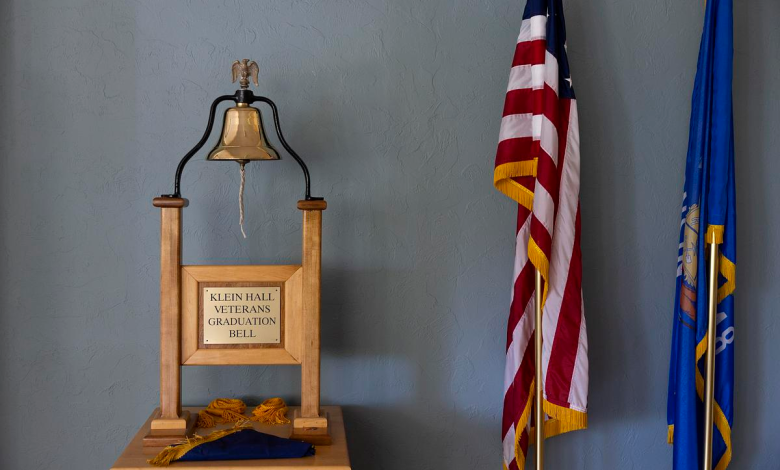As Wisconsin celebrates Veterans Day, lawmakers are considering these 12 veteran-related bills

by Brittany Carloni / Wisconsin Watch, Wisconsin Watch
November 10, 2025
More than 300,000 veterans who served their country call Wisconsin home.
During the 2025-26 legislative session, state lawmakers from both parties have proposed bills that would extend benefits to veterans, support memorials to wars they fought in and fund programs that help veterans who struggle with housing, mental health and substance abuse following their service.
But one of the biggest debates at the Capitol this session has been funding for the Veterans Housing and Recovery Program, which supports Wisconsin veterans at risk of homelessness. Veterans homes in Chippewa Falls and Green Bay closed in September after the Wisconsin Department of Veterans Affairs did not receive additional funding for the program during the budget process.
Earlier this year, Democratic Gov. Tony Evers proposed an additional $1.9 million for the Wisconsin Department of Veterans Affairs to fund increasing costs of operating veterans homes. But the Republican budget-writing committee later removed those dollars. GOP lawmakers have argued the WDVA already has funding to cover the costs of the veterans homes in a general appropriation that annually has been underspent, but the department has said the removal of veterans home funding from the budget casts doubt on the legality of using those funds.
Several proposals to fund the veterans homes have been introduced at the Capitol this year, but a solution has not yet made its way to Evers’ desk.
Here are notable bills on veterans issues moving through the legislative process. More legislation could be introduced as the current session continues.
Homeless veterans funding
Senate Bill 411/Assembly Bill 428
Lead authors: Sen. André Jacque, R-New Franken/Rep. Benjamin Franklin, R-De Pere
Summary: The bills would provide $1.95 million over the biennium to support the Veterans Housing and Recovery Program operated by the WDVA. It also requires the Universities of Wisconsin Board of Regents to fund the Missing in Action Recovery and Identification Project and reduces the disability rating threshold for veterans or their surviving spouses to claim property tax credits.
Of note: Evers told Wisconsin Watch in October that he would sign Jacque’s bill if it reaches his desk.
Status: Senate Bill 411 passed the Senate Committee on Natural Resources, Veteran and Military Affairs in October. Assembly Bill 428 was introduced in September but has not received a hearing.
Assembly Bill 596/Assembly Bill 597
Lead author: Franklin
Summary: Assembly Bill 597 would create a state-administered grant program to provide grants to organizations that house homeless veterans through the veterans trust fund. Assembly Bill 596 would provide $1.9 million over the biennium for up to $25 per day for homeless veterans housing organizations. The state funding would complement a federal Veterans Affairs grant program that awards up to $82.73 per day.
Of note: Joey Hoey, the assistant deputy secretary for the WDVA, testified before lawmakers that while the agency supports funding for homeless veterans, the bills would not allow the WDVA to reopen the veterans homes in Green Bay and Chippewa Falls that closed in September.
Status: The bills received public hearings in the Assembly Committee on Veterans and Military Affairs in October.
Senate Bill 385/Assembly Bill 383
Lead authors: Sen. Jeff Smith, D-Brunswick/Rep. Jodi Emerson, D-Eau Claire
Summary: The bills would provide $1.9 million over the next biennium to cover the increased costs of operating the Veterans Housing and Recovering facilities in Union Grove, Green Bay and Chippewa Falls. They also would help fund the lease of a new facility in Chippewa Falls.
Of note: The bills are the only proposals that provide the funding WDVA says it needs to fund the veterans homes without additional provisions in the legislation.
Status: The bills were introduced and referred to legislative committees.
Substance abuse and recovery support
Senate Bill 396/Assembly Bill 404
Lead authors: Sen. Dianne Hesselbein, D-Middleton/Rep. Robyn Vining, D-Wauwatosa
Summary: The bills would provide an additional $512,900 in the 2025-26 fiscal year and $602,800 during the 2026-27 fiscal year for the WDVA’s Veterans Outreach and Recovery Program, which provides support to veterans with mental health conditions and substance abuse disorders. It also increases the number of full-time positions for the program by seven employees.
Of note: A fiscal estimate states that the seven full-time positions were previously funded through American Rescue Plan dollars, but funding expired in July.
Status: Both bills were introduced this session and referred to legislative committees.
Housing and property taxes
Senate Bill 175/Assembly Bill 247
Lead authors: Jacque/Rep. Patrick Snyder, R-Weston
Summary: The bills would require local governments to reduce building permit fees by 75% or $500 if the permit is for improvements to the home of a disabled veteran and are necessary to accommodate their disability.
Of note: Paul Fisk, the legislative chair of the American Legion Department of Wisconsin, testified in support of the bill in April but noted Wisconsin’s proposal would be more restrictive than an Illinois proposal that became law in January. The Illinois law entirely waives permit fees for disabled veterans.
Status: The Senate version of the bill passed the Committee on Natural Resources, Veteran and Military Affairs in May. The Assembly bill was introduced and referred to a legislative committee.
Senate Bill 261/Assembly Bill 264
Lead authors: Smith/Rep. Christian Phelps, D-Eau Claire
Summary: The bills would allow a person to claim both the farmland preservation tax credit and the property tax credit for veterans and their surviving spouses in the same tax year.
Of note: A fiscal estimate for the bill indicates allowing Wisconsinites to claim both credits would reduce tax revenues by about $160,000 per year starting in the 2026 fiscal year.
Status: Both bills were introduced and referred to legislative committees.
Education
Senate Bill 587/Assembly Bill 591
Lead authors: Sen. Kristin Dassler-Alfheim, D-Appleton/Rep. Jill Billings, D-La Crosse
Summary: The bills would remove the funding cap for the Wisconsin GI Bill, which provides full tuition and fee remission to eligible veterans and their dependents at UW system schools and technical college districts.
Of note: In an October press release, Dassler-Alfheim said Wisconsin only covered 15% of the total costs for individuals attending a tech school and less for those attending a public university.
Status: Both bills were introduced in October and referred to legislative committees.
Senate Bill 59/Assembly Bill 47
Lead authors: Jacque/Rep. Dave Murphy, R-Hortonville
Summary: The bills eliminate five-year residency restrictions in current law that specify when a veteran or surviving spouse or child can be eligible for tuition and fee remission for UW system schools and technical colleges. Under the bills, people can get tuition and fees waived as long as they indicate they are Wisconsin residents immediately before registering at a school.
Of note: Representatives of the UW system and Wisconsin technical colleges testified that legislative appropriations are not covering the rising costs of remissions at their institutions.
Status: The Senate version of the bill passed the Senate Committee on Universities and Technical Colleges in October. The Assembly bill was introduced and referred to a legislative committee in February.
Memorials
Senate Bill 254/Assembly Bill 250
Lead authors: Sen. Eric Wimberger, R-Oconto/Rep. Tony Kurtz, R-Wonewoc
Summary: The bills would create a continuing appropriation at a total of $9 million within the Wisconsin Department of Veterans Affairs designated to support the preservation of the Milwaukee War Memorial Center.
Of note: Annual maintenance costs for inside the 67-year-old memorial exceed $800,000, members of the war memorial’s board of trustees wrote to lawmakers in April.
Status: The Assembly bill unanimously passed the Committee on Veterans and Military Affairs in June but hasn’t been scheduled for an Assembly vote. The Senate bill was introduced in May and referred to a legislative committee.
More veterans benefits
Senate Bill 2/Assembly Bill 27
Lead authors: Jacque/Murphy
Summary: The bills would expand the definition of veterans in Wisconsin to include people who served in Special Guerrilla Units operating in Laos during the Vietnam War and were naturalized under the Hmong Veterans’ Naturalization Act of 2000. It would not include admission to state veterans homes or burial in a veterans cemetery. Those are subject to federal laws.
Of note: In January testimony, Jacque said that there are as many as 1,000 Hmong veterans in Wisconsin.
Status: The Senate bill passed the chamber in May. The Assembly bill passed the Committee on Veterans and Military Affairs but has not been scheduled for a floor vote.
Senate Bill 387/Assembly Bill 389
Lead authors: Jacque/Franklin
Summary: The bills would change the definition of veteran to allow former members of the U.S. Army reserves or the National Guard to indicate their veteran status on their driver’s license or identification card. Current law does not allow veterans of the reserves or the National Guard to include that status on licenses.
Of note: A fiscal estimate for the bill from the WDVA states that license applicants who want their veteran status on their identification must provide verification of their eligibility to the agency or a county veterans service officer. The agency processes 6,000 to 7,000 veteran status forms each year.
Status: Both bills were introduced and referred to legislative committees.
Senate Bill 505
Lead author: Smith
Summary: The bill would allow disabled veterans with an up-to-date deer hunting license to hunt deer of either sex during any open firearm season, which is currently only available to active members of the U.S. military who are on furlough or leave in Wisconsin.
Of note: A fiscal estimate for the bill suggests about 5,947 gun deer licenses sold by the Department of Natural Resources in the 2025 fiscal year were purchased by disabled veterans.
Status: The bill was introduced in October and referred to a legislative committee.
This article first appeared on Wisconsin Watch and is republished here under a Creative Commons Attribution-NoDerivatives 4.0 International License.![]()





